Insolvent Trading: An IRAC Analysis of Hall v Poolman Case Study
VerifiedAdded on 2020/04/01
|11
|2832
|518
Case Study
AI Summary
This assignment presents an IRAC (Issue, Rule, Application, Conclusion) analysis of the corporate law case Hall v Poolman (2007). It examines the responsibilities of company directors, specifically concerning insolvent trading under the Corporations Act 2001 (Cth). The case involves the Reynolds Group of companies, which entered voluntary administration and liquidation. The analysis focuses on the directors' liability for decisions made during financial hardship, the application of Section 588G regarding insolvent trading, and the defenses available under Section 588H and the potential for relief under sections 1317S and 1318. The case highlights the importance of solvency, the concept of separate legal entities, and the standards of honesty and reasonable expectation in determining director liability. The analysis concludes that the directors, particularly Poolman, were found to have breached section 588G. The assignment provides a detailed breakdown of the legal principles and their application to the facts of the case, offering a comprehensive understanding of the court's outcome and implications for corporate governance.

Paraphrase This Document
Need a fresh take? Get an instant paraphrase of this document with our AI Paraphraser
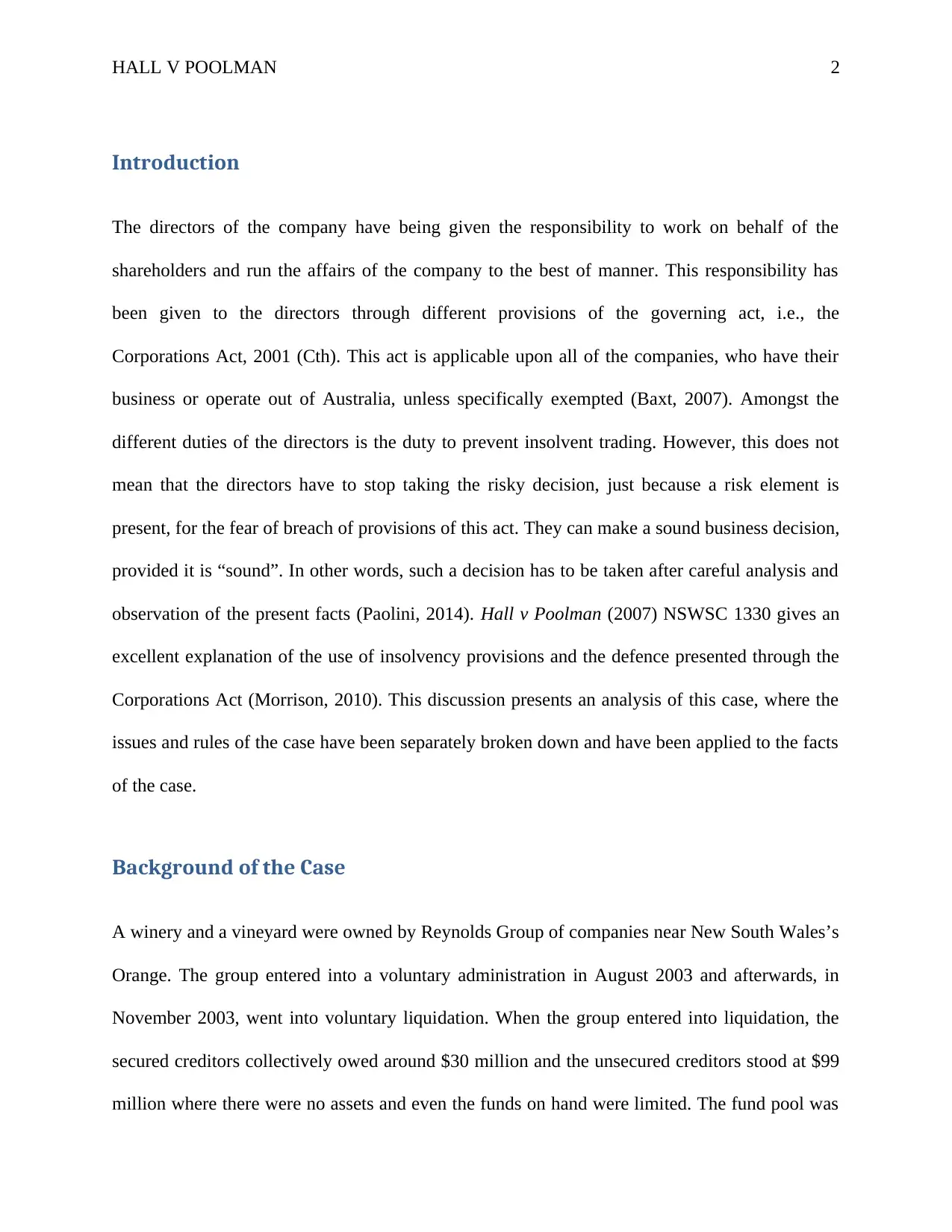
HALL V POOLMAN 2
Introduction
The directors of the company have being given the responsibility to work on behalf of the
shareholders and run the affairs of the company to the best of manner. This responsibility has
been given to the directors through different provisions of the governing act, i.e., the
Corporations Act, 2001 (Cth). This act is applicable upon all of the companies, who have their
business or operate out of Australia, unless specifically exempted (Baxt, 2007). Amongst the
different duties of the directors is the duty to prevent insolvent trading. However, this does not
mean that the directors have to stop taking the risky decision, just because a risk element is
present, for the fear of breach of provisions of this act. They can make a sound business decision,
provided it is “sound”. In other words, such a decision has to be taken after careful analysis and
observation of the present facts (Paolini, 2014). Hall v Poolman (2007) NSWSC 1330 gives an
excellent explanation of the use of insolvency provisions and the defence presented through the
Corporations Act (Morrison, 2010). This discussion presents an analysis of this case, where the
issues and rules of the case have been separately broken down and have been applied to the facts
of the case.
Background of the Case
A winery and a vineyard were owned by Reynolds Group of companies near New South Wales’s
Orange. The group entered into a voluntary administration in August 2003 and afterwards, in
November 2003, went into voluntary liquidation. When the group entered into liquidation, the
secured creditors collectively owed around $30 million and the unsecured creditors stood at $99
million where there were no assets and even the funds on hand were limited. The fund pool was
Introduction
The directors of the company have being given the responsibility to work on behalf of the
shareholders and run the affairs of the company to the best of manner. This responsibility has
been given to the directors through different provisions of the governing act, i.e., the
Corporations Act, 2001 (Cth). This act is applicable upon all of the companies, who have their
business or operate out of Australia, unless specifically exempted (Baxt, 2007). Amongst the
different duties of the directors is the duty to prevent insolvent trading. However, this does not
mean that the directors have to stop taking the risky decision, just because a risk element is
present, for the fear of breach of provisions of this act. They can make a sound business decision,
provided it is “sound”. In other words, such a decision has to be taken after careful analysis and
observation of the present facts (Paolini, 2014). Hall v Poolman (2007) NSWSC 1330 gives an
excellent explanation of the use of insolvency provisions and the defence presented through the
Corporations Act (Morrison, 2010). This discussion presents an analysis of this case, where the
issues and rules of the case have been separately broken down and have been applied to the facts
of the case.
Background of the Case
A winery and a vineyard were owned by Reynolds Group of companies near New South Wales’s
Orange. The group entered into a voluntary administration in August 2003 and afterwards, in
November 2003, went into voluntary liquidation. When the group entered into liquidation, the
secured creditors collectively owed around $30 million and the unsecured creditors stood at $99
million where there were no assets and even the funds on hand were limited. The fund pool was
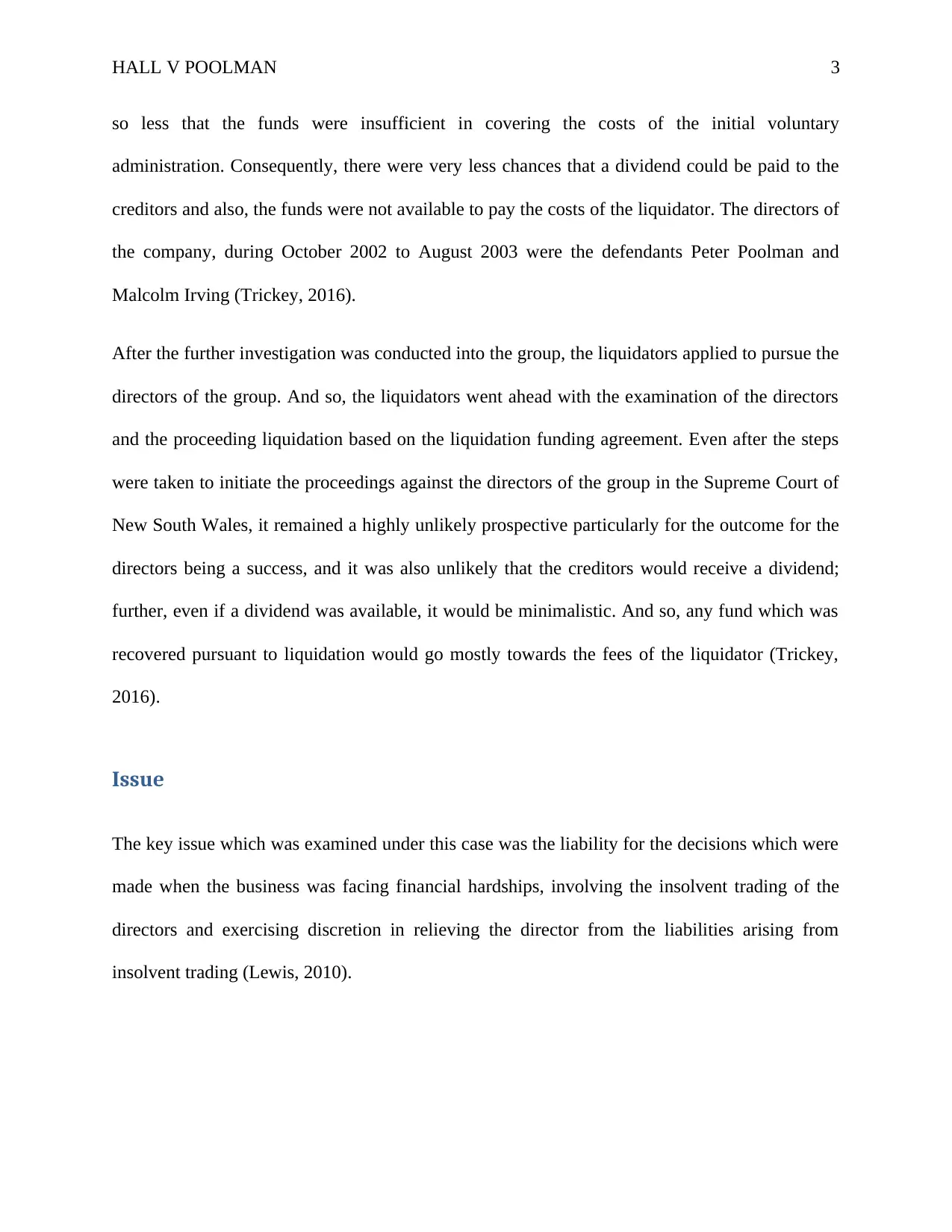
HALL V POOLMAN 3
so less that the funds were insufficient in covering the costs of the initial voluntary
administration. Consequently, there were very less chances that a dividend could be paid to the
creditors and also, the funds were not available to pay the costs of the liquidator. The directors of
the company, during October 2002 to August 2003 were the defendants Peter Poolman and
Malcolm Irving (Trickey, 2016).
After the further investigation was conducted into the group, the liquidators applied to pursue the
directors of the group. And so, the liquidators went ahead with the examination of the directors
and the proceeding liquidation based on the liquidation funding agreement. Even after the steps
were taken to initiate the proceedings against the directors of the group in the Supreme Court of
New South Wales, it remained a highly unlikely prospective particularly for the outcome for the
directors being a success, and it was also unlikely that the creditors would receive a dividend;
further, even if a dividend was available, it would be minimalistic. And so, any fund which was
recovered pursuant to liquidation would go mostly towards the fees of the liquidator (Trickey,
2016).
Issue
The key issue which was examined under this case was the liability for the decisions which were
made when the business was facing financial hardships, involving the insolvent trading of the
directors and exercising discretion in relieving the director from the liabilities arising from
insolvent trading (Lewis, 2010).
so less that the funds were insufficient in covering the costs of the initial voluntary
administration. Consequently, there were very less chances that a dividend could be paid to the
creditors and also, the funds were not available to pay the costs of the liquidator. The directors of
the company, during October 2002 to August 2003 were the defendants Peter Poolman and
Malcolm Irving (Trickey, 2016).
After the further investigation was conducted into the group, the liquidators applied to pursue the
directors of the group. And so, the liquidators went ahead with the examination of the directors
and the proceeding liquidation based on the liquidation funding agreement. Even after the steps
were taken to initiate the proceedings against the directors of the group in the Supreme Court of
New South Wales, it remained a highly unlikely prospective particularly for the outcome for the
directors being a success, and it was also unlikely that the creditors would receive a dividend;
further, even if a dividend was available, it would be minimalistic. And so, any fund which was
recovered pursuant to liquidation would go mostly towards the fees of the liquidator (Trickey,
2016).
Issue
The key issue which was examined under this case was the liability for the decisions which were
made when the business was facing financial hardships, involving the insolvent trading of the
directors and exercising discretion in relieving the director from the liabilities arising from
insolvent trading (Lewis, 2010).
⊘ This is a preview!⊘
Do you want full access?
Subscribe today to unlock all pages.

Trusted by 1+ million students worldwide
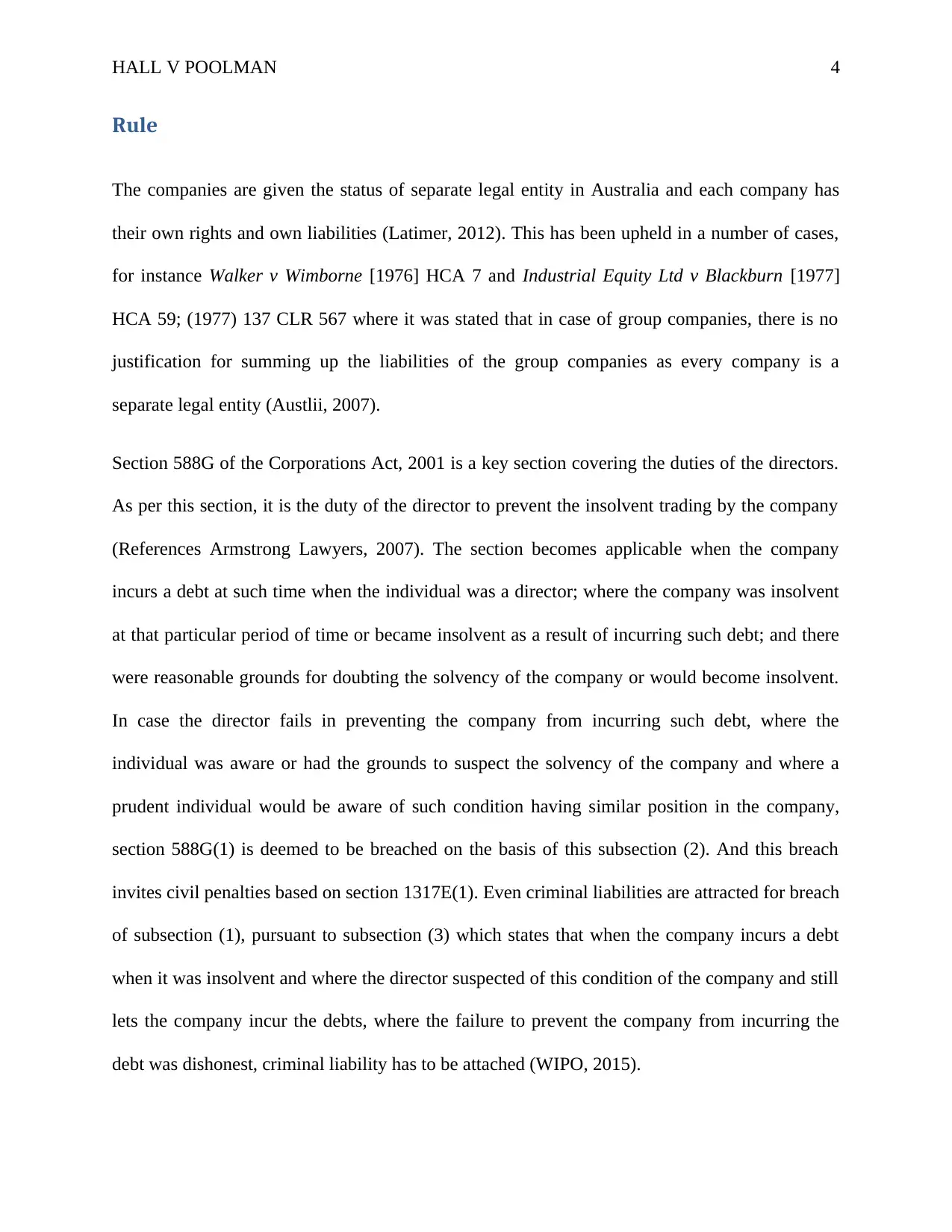
HALL V POOLMAN 4
Rule
The companies are given the status of separate legal entity in Australia and each company has
their own rights and own liabilities (Latimer, 2012). This has been upheld in a number of cases,
for instance Walker v Wimborne [1976] HCA 7 and Industrial Equity Ltd v Blackburn [1977]
HCA 59; (1977) 137 CLR 567 where it was stated that in case of group companies, there is no
justification for summing up the liabilities of the group companies as every company is a
separate legal entity (Austlii, 2007).
Section 588G of the Corporations Act, 2001 is a key section covering the duties of the directors.
As per this section, it is the duty of the director to prevent the insolvent trading by the company
(References Armstrong Lawyers, 2007). The section becomes applicable when the company
incurs a debt at such time when the individual was a director; where the company was insolvent
at that particular period of time or became insolvent as a result of incurring such debt; and there
were reasonable grounds for doubting the solvency of the company or would become insolvent.
In case the director fails in preventing the company from incurring such debt, where the
individual was aware or had the grounds to suspect the solvency of the company and where a
prudent individual would be aware of such condition having similar position in the company,
section 588G(1) is deemed to be breached on the basis of this subsection (2). And this breach
invites civil penalties based on section 1317E(1). Even criminal liabilities are attracted for breach
of subsection (1), pursuant to subsection (3) which states that when the company incurs a debt
when it was insolvent and where the director suspected of this condition of the company and still
lets the company incur the debts, where the failure to prevent the company from incurring the
debt was dishonest, criminal liability has to be attached (WIPO, 2015).
Rule
The companies are given the status of separate legal entity in Australia and each company has
their own rights and own liabilities (Latimer, 2012). This has been upheld in a number of cases,
for instance Walker v Wimborne [1976] HCA 7 and Industrial Equity Ltd v Blackburn [1977]
HCA 59; (1977) 137 CLR 567 where it was stated that in case of group companies, there is no
justification for summing up the liabilities of the group companies as every company is a
separate legal entity (Austlii, 2007).
Section 588G of the Corporations Act, 2001 is a key section covering the duties of the directors.
As per this section, it is the duty of the director to prevent the insolvent trading by the company
(References Armstrong Lawyers, 2007). The section becomes applicable when the company
incurs a debt at such time when the individual was a director; where the company was insolvent
at that particular period of time or became insolvent as a result of incurring such debt; and there
were reasonable grounds for doubting the solvency of the company or would become insolvent.
In case the director fails in preventing the company from incurring such debt, where the
individual was aware or had the grounds to suspect the solvency of the company and where a
prudent individual would be aware of such condition having similar position in the company,
section 588G(1) is deemed to be breached on the basis of this subsection (2). And this breach
invites civil penalties based on section 1317E(1). Even criminal liabilities are attracted for breach
of subsection (1), pursuant to subsection (3) which states that when the company incurs a debt
when it was insolvent and where the director suspected of this condition of the company and still
lets the company incur the debts, where the failure to prevent the company from incurring the
debt was dishonest, criminal liability has to be attached (WIPO, 2015).
Paraphrase This Document
Need a fresh take? Get an instant paraphrase of this document with our AI Paraphraser
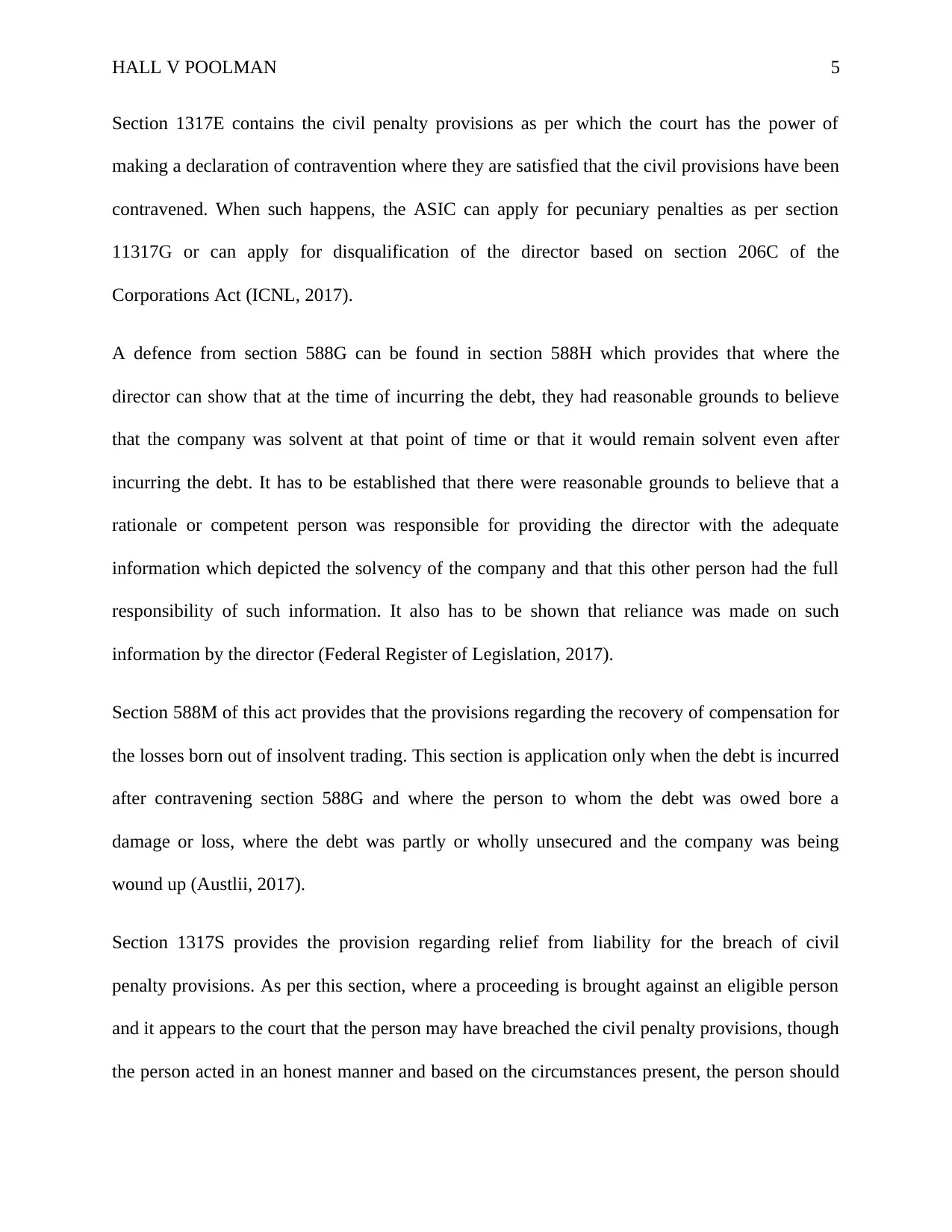
HALL V POOLMAN 5
Section 1317E contains the civil penalty provisions as per which the court has the power of
making a declaration of contravention where they are satisfied that the civil provisions have been
contravened. When such happens, the ASIC can apply for pecuniary penalties as per section
11317G or can apply for disqualification of the director based on section 206C of the
Corporations Act (ICNL, 2017).
A defence from section 588G can be found in section 588H which provides that where the
director can show that at the time of incurring the debt, they had reasonable grounds to believe
that the company was solvent at that point of time or that it would remain solvent even after
incurring the debt. It has to be established that there were reasonable grounds to believe that a
rationale or competent person was responsible for providing the director with the adequate
information which depicted the solvency of the company and that this other person had the full
responsibility of such information. It also has to be shown that reliance was made on such
information by the director (Federal Register of Legislation, 2017).
Section 588M of this act provides that the provisions regarding the recovery of compensation for
the losses born out of insolvent trading. This section is application only when the debt is incurred
after contravening section 588G and where the person to whom the debt was owed bore a
damage or loss, where the debt was partly or wholly unsecured and the company was being
wound up (Austlii, 2017).
Section 1317S provides the provision regarding relief from liability for the breach of civil
penalty provisions. As per this section, where a proceeding is brought against an eligible person
and it appears to the court that the person may have breached the civil penalty provisions, though
the person acted in an honest manner and based on the circumstances present, the person should
Section 1317E contains the civil penalty provisions as per which the court has the power of
making a declaration of contravention where they are satisfied that the civil provisions have been
contravened. When such happens, the ASIC can apply for pecuniary penalties as per section
11317G or can apply for disqualification of the director based on section 206C of the
Corporations Act (ICNL, 2017).
A defence from section 588G can be found in section 588H which provides that where the
director can show that at the time of incurring the debt, they had reasonable grounds to believe
that the company was solvent at that point of time or that it would remain solvent even after
incurring the debt. It has to be established that there were reasonable grounds to believe that a
rationale or competent person was responsible for providing the director with the adequate
information which depicted the solvency of the company and that this other person had the full
responsibility of such information. It also has to be shown that reliance was made on such
information by the director (Federal Register of Legislation, 2017).
Section 588M of this act provides that the provisions regarding the recovery of compensation for
the losses born out of insolvent trading. This section is application only when the debt is incurred
after contravening section 588G and where the person to whom the debt was owed bore a
damage or loss, where the debt was partly or wholly unsecured and the company was being
wound up (Austlii, 2017).
Section 1317S provides the provision regarding relief from liability for the breach of civil
penalty provisions. As per this section, where a proceeding is brought against an eligible person
and it appears to the court that the person may have breached the civil penalty provisions, though
the person acted in an honest manner and based on the circumstances present, the person should
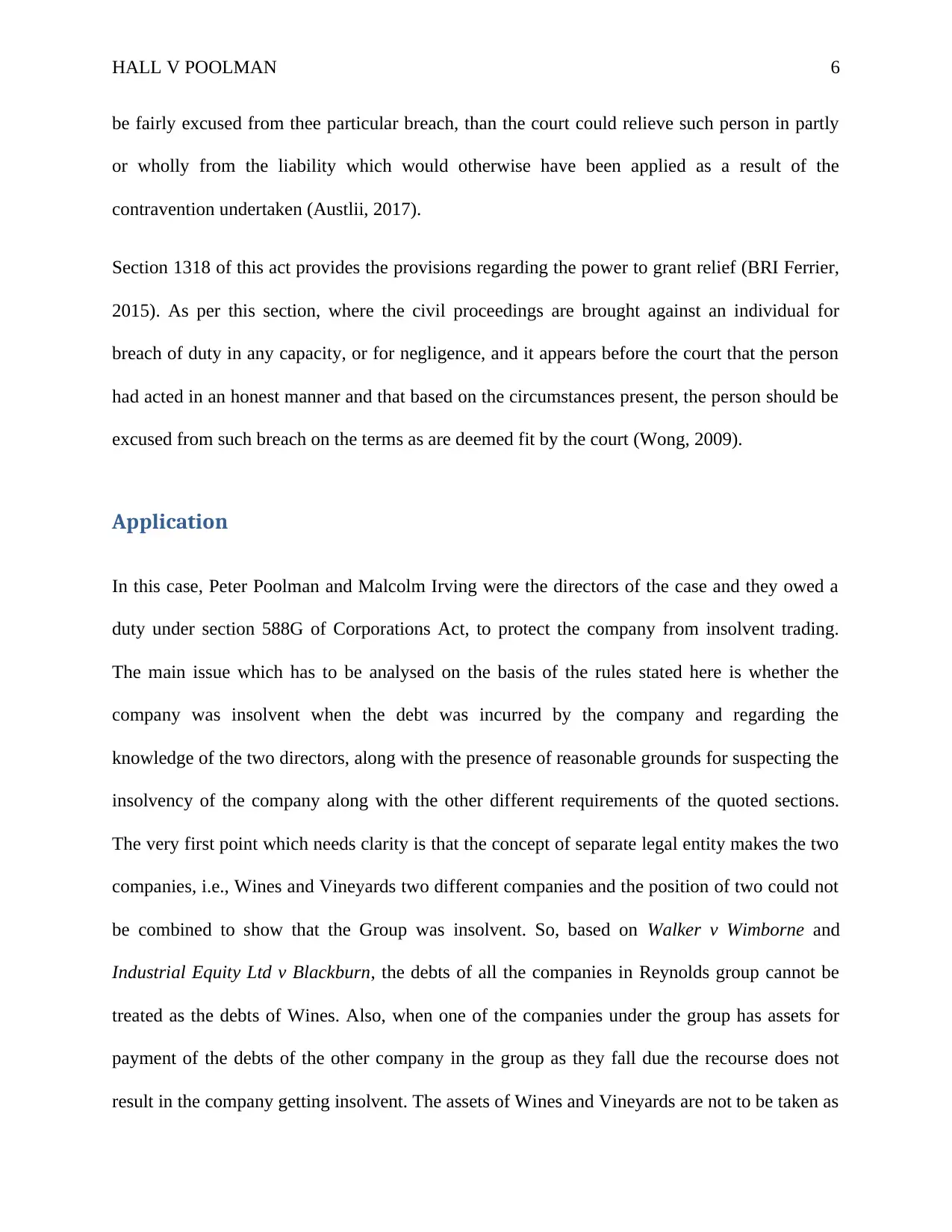
HALL V POOLMAN 6
be fairly excused from thee particular breach, than the court could relieve such person in partly
or wholly from the liability which would otherwise have been applied as a result of the
contravention undertaken (Austlii, 2017).
Section 1318 of this act provides the provisions regarding the power to grant relief (BRI Ferrier,
2015). As per this section, where the civil proceedings are brought against an individual for
breach of duty in any capacity, or for negligence, and it appears before the court that the person
had acted in an honest manner and that based on the circumstances present, the person should be
excused from such breach on the terms as are deemed fit by the court (Wong, 2009).
Application
In this case, Peter Poolman and Malcolm Irving were the directors of the case and they owed a
duty under section 588G of Corporations Act, to protect the company from insolvent trading.
The main issue which has to be analysed on the basis of the rules stated here is whether the
company was insolvent when the debt was incurred by the company and regarding the
knowledge of the two directors, along with the presence of reasonable grounds for suspecting the
insolvency of the company along with the other different requirements of the quoted sections.
The very first point which needs clarity is that the concept of separate legal entity makes the two
companies, i.e., Wines and Vineyards two different companies and the position of two could not
be combined to show that the Group was insolvent. So, based on Walker v Wimborne and
Industrial Equity Ltd v Blackburn, the debts of all the companies in Reynolds group cannot be
treated as the debts of Wines. Also, when one of the companies under the group has assets for
payment of the debts of the other company in the group as they fall due the recourse does not
result in the company getting insolvent. The assets of Wines and Vineyards are not to be taken as
be fairly excused from thee particular breach, than the court could relieve such person in partly
or wholly from the liability which would otherwise have been applied as a result of the
contravention undertaken (Austlii, 2017).
Section 1318 of this act provides the provisions regarding the power to grant relief (BRI Ferrier,
2015). As per this section, where the civil proceedings are brought against an individual for
breach of duty in any capacity, or for negligence, and it appears before the court that the person
had acted in an honest manner and that based on the circumstances present, the person should be
excused from such breach on the terms as are deemed fit by the court (Wong, 2009).
Application
In this case, Peter Poolman and Malcolm Irving were the directors of the case and they owed a
duty under section 588G of Corporations Act, to protect the company from insolvent trading.
The main issue which has to be analysed on the basis of the rules stated here is whether the
company was insolvent when the debt was incurred by the company and regarding the
knowledge of the two directors, along with the presence of reasonable grounds for suspecting the
insolvency of the company along with the other different requirements of the quoted sections.
The very first point which needs clarity is that the concept of separate legal entity makes the two
companies, i.e., Wines and Vineyards two different companies and the position of two could not
be combined to show that the Group was insolvent. So, based on Walker v Wimborne and
Industrial Equity Ltd v Blackburn, the debts of all the companies in Reynolds group cannot be
treated as the debts of Wines. Also, when one of the companies under the group has assets for
payment of the debts of the other company in the group as they fall due the recourse does not
result in the company getting insolvent. The assets of Wines and Vineyards are not to be taken as
⊘ This is a preview!⊘
Do you want full access?
Subscribe today to unlock all pages.

Trusted by 1+ million students worldwide
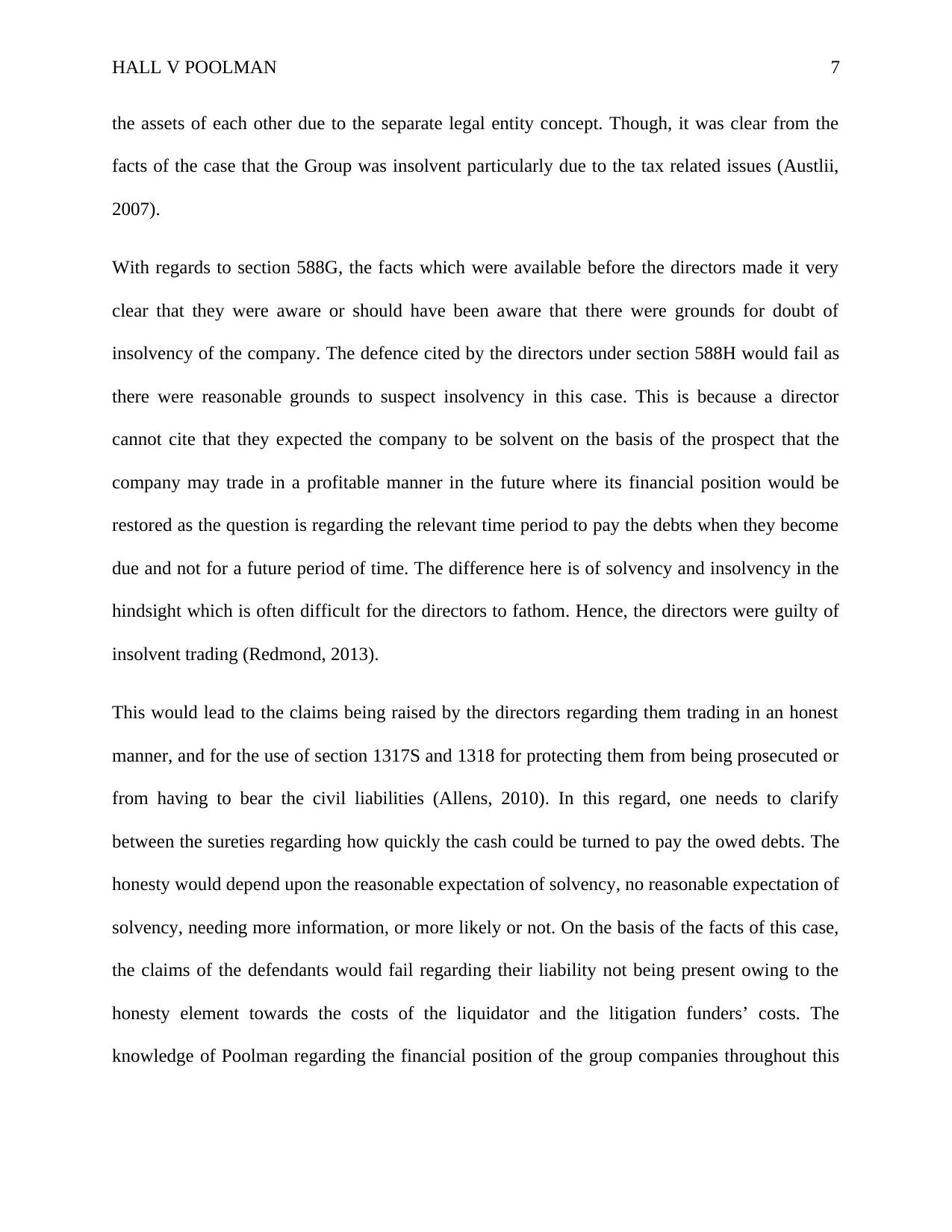
HALL V POOLMAN 7
the assets of each other due to the separate legal entity concept. Though, it was clear from the
facts of the case that the Group was insolvent particularly due to the tax related issues (Austlii,
2007).
With regards to section 588G, the facts which were available before the directors made it very
clear that they were aware or should have been aware that there were grounds for doubt of
insolvency of the company. The defence cited by the directors under section 588H would fail as
there were reasonable grounds to suspect insolvency in this case. This is because a director
cannot cite that they expected the company to be solvent on the basis of the prospect that the
company may trade in a profitable manner in the future where its financial position would be
restored as the question is regarding the relevant time period to pay the debts when they become
due and not for a future period of time. The difference here is of solvency and insolvency in the
hindsight which is often difficult for the directors to fathom. Hence, the directors were guilty of
insolvent trading (Redmond, 2013).
This would lead to the claims being raised by the directors regarding them trading in an honest
manner, and for the use of section 1317S and 1318 for protecting them from being prosecuted or
from having to bear the civil liabilities (Allens, 2010). In this regard, one needs to clarify
between the sureties regarding how quickly the cash could be turned to pay the owed debts. The
honesty would depend upon the reasonable expectation of solvency, no reasonable expectation of
solvency, needing more information, or more likely or not. On the basis of the facts of this case,
the claims of the defendants would fail regarding their liability not being present owing to the
honesty element towards the costs of the liquidator and the litigation funders’ costs. The
knowledge of Poolman regarding the financial position of the group companies throughout this
the assets of each other due to the separate legal entity concept. Though, it was clear from the
facts of the case that the Group was insolvent particularly due to the tax related issues (Austlii,
2007).
With regards to section 588G, the facts which were available before the directors made it very
clear that they were aware or should have been aware that there were grounds for doubt of
insolvency of the company. The defence cited by the directors under section 588H would fail as
there were reasonable grounds to suspect insolvency in this case. This is because a director
cannot cite that they expected the company to be solvent on the basis of the prospect that the
company may trade in a profitable manner in the future where its financial position would be
restored as the question is regarding the relevant time period to pay the debts when they become
due and not for a future period of time. The difference here is of solvency and insolvency in the
hindsight which is often difficult for the directors to fathom. Hence, the directors were guilty of
insolvent trading (Redmond, 2013).
This would lead to the claims being raised by the directors regarding them trading in an honest
manner, and for the use of section 1317S and 1318 for protecting them from being prosecuted or
from having to bear the civil liabilities (Allens, 2010). In this regard, one needs to clarify
between the sureties regarding how quickly the cash could be turned to pay the owed debts. The
honesty would depend upon the reasonable expectation of solvency, no reasonable expectation of
solvency, needing more information, or more likely or not. On the basis of the facts of this case,
the claims of the defendants would fail regarding their liability not being present owing to the
honesty element towards the costs of the liquidator and the litigation funders’ costs. The
knowledge of Poolman regarding the financial position of the group companies throughout this
Paraphrase This Document
Need a fresh take? Get an instant paraphrase of this document with our AI Paraphraser
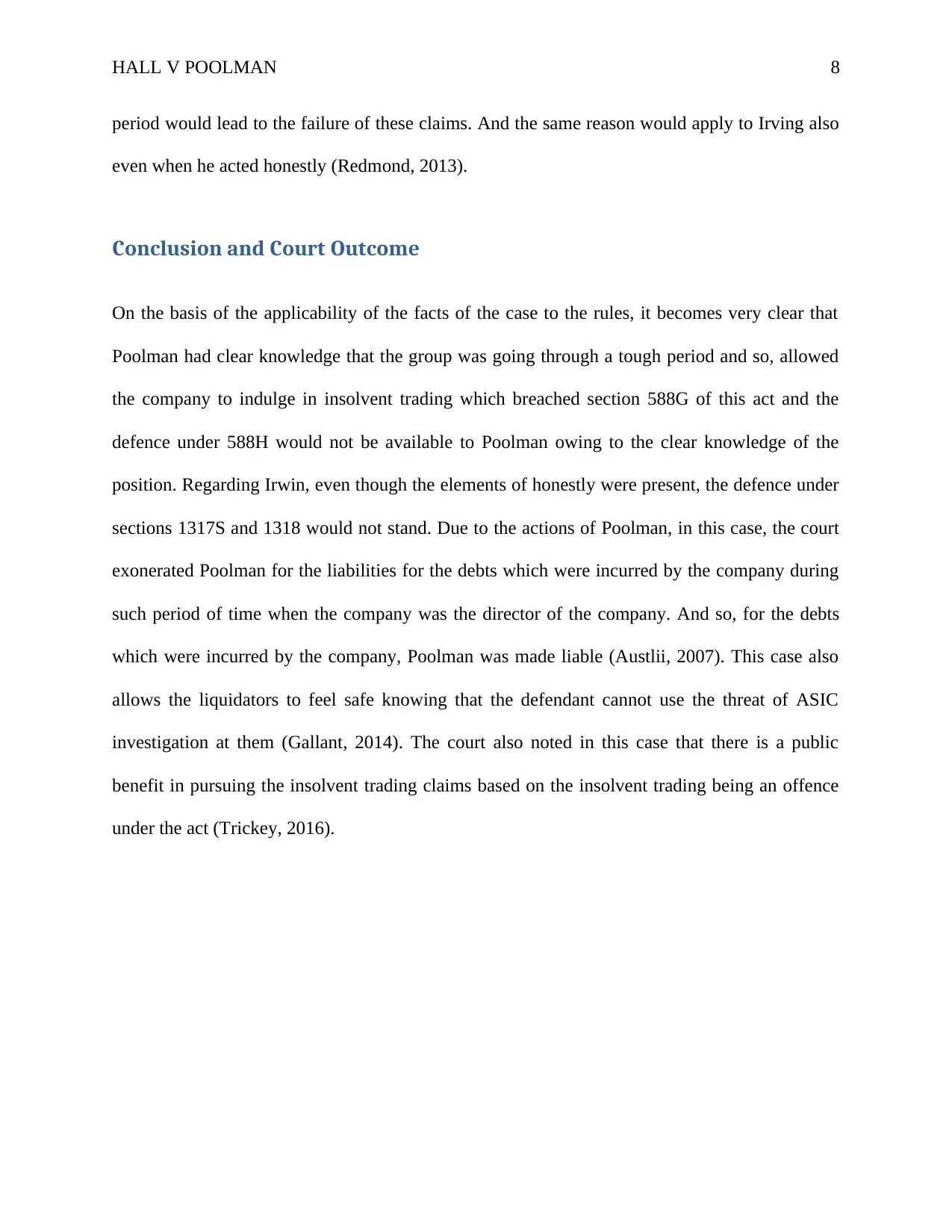
HALL V POOLMAN 8
period would lead to the failure of these claims. And the same reason would apply to Irving also
even when he acted honestly (Redmond, 2013).
Conclusion and Court Outcome
On the basis of the applicability of the facts of the case to the rules, it becomes very clear that
Poolman had clear knowledge that the group was going through a tough period and so, allowed
the company to indulge in insolvent trading which breached section 588G of this act and the
defence under 588H would not be available to Poolman owing to the clear knowledge of the
position. Regarding Irwin, even though the elements of honestly were present, the defence under
sections 1317S and 1318 would not stand. Due to the actions of Poolman, in this case, the court
exonerated Poolman for the liabilities for the debts which were incurred by the company during
such period of time when the company was the director of the company. And so, for the debts
which were incurred by the company, Poolman was made liable (Austlii, 2007). This case also
allows the liquidators to feel safe knowing that the defendant cannot use the threat of ASIC
investigation at them (Gallant, 2014). The court also noted in this case that there is a public
benefit in pursuing the insolvent trading claims based on the insolvent trading being an offence
under the act (Trickey, 2016).
period would lead to the failure of these claims. And the same reason would apply to Irving also
even when he acted honestly (Redmond, 2013).
Conclusion and Court Outcome
On the basis of the applicability of the facts of the case to the rules, it becomes very clear that
Poolman had clear knowledge that the group was going through a tough period and so, allowed
the company to indulge in insolvent trading which breached section 588G of this act and the
defence under 588H would not be available to Poolman owing to the clear knowledge of the
position. Regarding Irwin, even though the elements of honestly were present, the defence under
sections 1317S and 1318 would not stand. Due to the actions of Poolman, in this case, the court
exonerated Poolman for the liabilities for the debts which were incurred by the company during
such period of time when the company was the director of the company. And so, for the debts
which were incurred by the company, Poolman was made liable (Austlii, 2007). This case also
allows the liquidators to feel safe knowing that the defendant cannot use the threat of ASIC
investigation at them (Gallant, 2014). The court also noted in this case that there is a public
benefit in pursuing the insolvent trading claims based on the insolvent trading being an offence
under the act (Trickey, 2016).
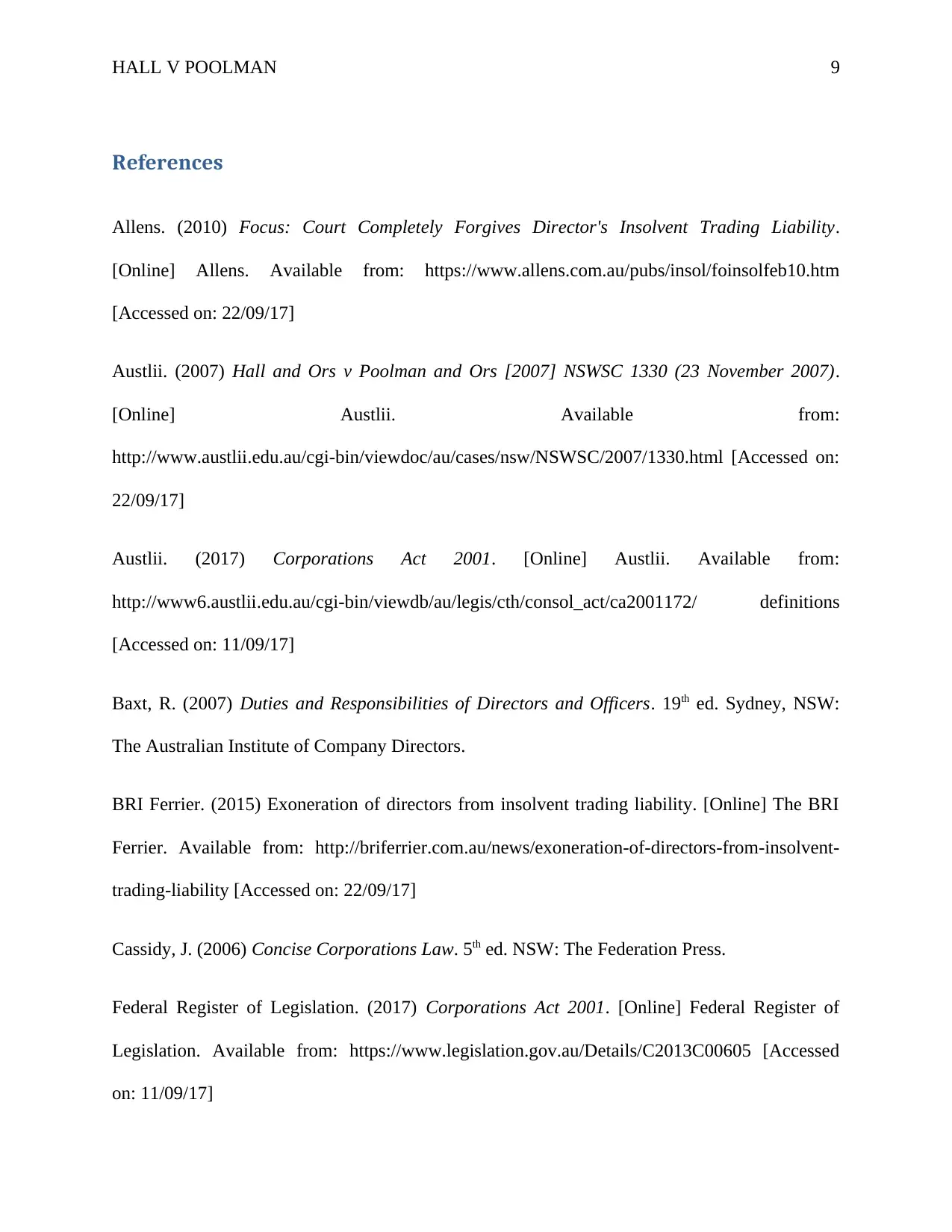
HALL V POOLMAN 9
References
Allens. (2010) Focus: Court Completely Forgives Director's Insolvent Trading Liability.
[Online] Allens. Available from: https://www.allens.com.au/pubs/insol/foinsolfeb10.htm
[Accessed on: 22/09/17]
Austlii. (2007) Hall and Ors v Poolman and Ors [2007] NSWSC 1330 (23 November 2007).
[Online] Austlii. Available from:
http://www.austlii.edu.au/cgi-bin/viewdoc/au/cases/nsw/NSWSC/2007/1330.html [Accessed on:
22/09/17]
Austlii. (2017) Corporations Act 2001. [Online] Austlii. Available from:
http://www6.austlii.edu.au/cgi-bin/viewdb/au/legis/cth/consol_act/ca2001172/ definitions
[Accessed on: 11/09/17]
Baxt, R. (2007) Duties and Responsibilities of Directors and Officers. 19th ed. Sydney, NSW:
The Australian Institute of Company Directors.
BRI Ferrier. (2015) Exoneration of directors from insolvent trading liability. [Online] The BRI
Ferrier. Available from: http://briferrier.com.au/news/exoneration-of-directors-from-insolvent-
trading-liability [Accessed on: 22/09/17]
Cassidy, J. (2006) Concise Corporations Law. 5th ed. NSW: The Federation Press.
Federal Register of Legislation. (2017) Corporations Act 2001. [Online] Federal Register of
Legislation. Available from: https://www.legislation.gov.au/Details/C2013C00605 [Accessed
on: 11/09/17]
References
Allens. (2010) Focus: Court Completely Forgives Director's Insolvent Trading Liability.
[Online] Allens. Available from: https://www.allens.com.au/pubs/insol/foinsolfeb10.htm
[Accessed on: 22/09/17]
Austlii. (2007) Hall and Ors v Poolman and Ors [2007] NSWSC 1330 (23 November 2007).
[Online] Austlii. Available from:
http://www.austlii.edu.au/cgi-bin/viewdoc/au/cases/nsw/NSWSC/2007/1330.html [Accessed on:
22/09/17]
Austlii. (2017) Corporations Act 2001. [Online] Austlii. Available from:
http://www6.austlii.edu.au/cgi-bin/viewdb/au/legis/cth/consol_act/ca2001172/ definitions
[Accessed on: 11/09/17]
Baxt, R. (2007) Duties and Responsibilities of Directors and Officers. 19th ed. Sydney, NSW:
The Australian Institute of Company Directors.
BRI Ferrier. (2015) Exoneration of directors from insolvent trading liability. [Online] The BRI
Ferrier. Available from: http://briferrier.com.au/news/exoneration-of-directors-from-insolvent-
trading-liability [Accessed on: 22/09/17]
Cassidy, J. (2006) Concise Corporations Law. 5th ed. NSW: The Federation Press.
Federal Register of Legislation. (2017) Corporations Act 2001. [Online] Federal Register of
Legislation. Available from: https://www.legislation.gov.au/Details/C2013C00605 [Accessed
on: 11/09/17]
⊘ This is a preview!⊘
Do you want full access?
Subscribe today to unlock all pages.

Trusted by 1+ million students worldwide
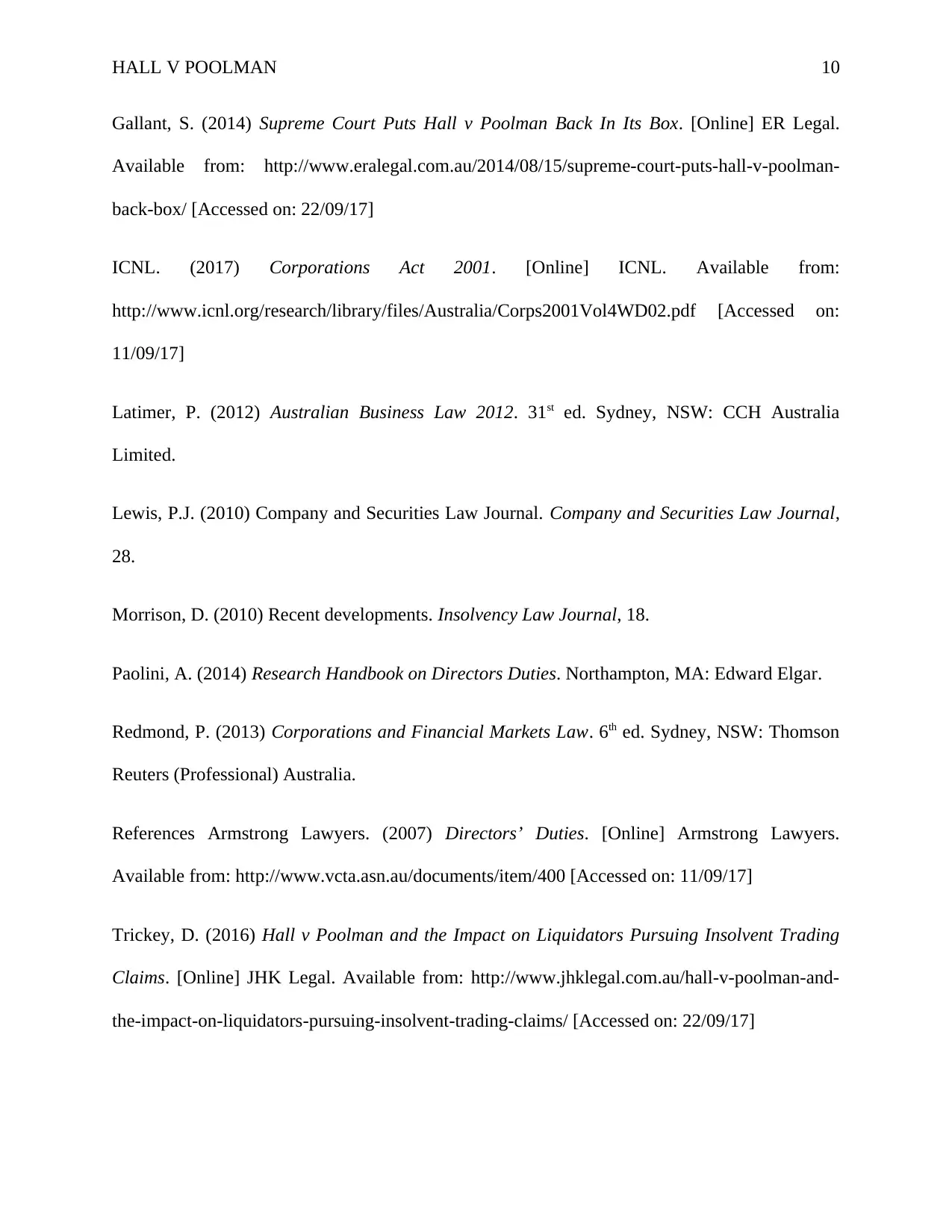
HALL V POOLMAN 10
Gallant, S. (2014) Supreme Court Puts Hall v Poolman Back In Its Box. [Online] ER Legal.
Available from: http://www.eralegal.com.au/2014/08/15/supreme-court-puts-hall-v-poolman-
back-box/ [Accessed on: 22/09/17]
ICNL. (2017) Corporations Act 2001. [Online] ICNL. Available from:
http://www.icnl.org/research/library/files/Australia/Corps2001Vol4WD02.pdf [Accessed on:
11/09/17]
Latimer, P. (2012) Australian Business Law 2012. 31st ed. Sydney, NSW: CCH Australia
Limited.
Lewis, P.J. (2010) Company and Securities Law Journal. Company and Securities Law Journal,
28.
Morrison, D. (2010) Recent developments. Insolvency Law Journal, 18.
Paolini, A. (2014) Research Handbook on Directors Duties. Northampton, MA: Edward Elgar.
Redmond, P. (2013) Corporations and Financial Markets Law. 6th ed. Sydney, NSW: Thomson
Reuters (Professional) Australia.
References Armstrong Lawyers. (2007) Directors’ Duties. [Online] Armstrong Lawyers.
Available from: http://www.vcta.asn.au/documents/item/400 [Accessed on: 11/09/17]
Trickey, D. (2016) Hall v Poolman and the Impact on Liquidators Pursuing Insolvent Trading
Claims. [Online] JHK Legal. Available from: http://www.jhklegal.com.au/hall-v-poolman-and-
the-impact-on-liquidators-pursuing-insolvent-trading-claims/ [Accessed on: 22/09/17]
Gallant, S. (2014) Supreme Court Puts Hall v Poolman Back In Its Box. [Online] ER Legal.
Available from: http://www.eralegal.com.au/2014/08/15/supreme-court-puts-hall-v-poolman-
back-box/ [Accessed on: 22/09/17]
ICNL. (2017) Corporations Act 2001. [Online] ICNL. Available from:
http://www.icnl.org/research/library/files/Australia/Corps2001Vol4WD02.pdf [Accessed on:
11/09/17]
Latimer, P. (2012) Australian Business Law 2012. 31st ed. Sydney, NSW: CCH Australia
Limited.
Lewis, P.J. (2010) Company and Securities Law Journal. Company and Securities Law Journal,
28.
Morrison, D. (2010) Recent developments. Insolvency Law Journal, 18.
Paolini, A. (2014) Research Handbook on Directors Duties. Northampton, MA: Edward Elgar.
Redmond, P. (2013) Corporations and Financial Markets Law. 6th ed. Sydney, NSW: Thomson
Reuters (Professional) Australia.
References Armstrong Lawyers. (2007) Directors’ Duties. [Online] Armstrong Lawyers.
Available from: http://www.vcta.asn.au/documents/item/400 [Accessed on: 11/09/17]
Trickey, D. (2016) Hall v Poolman and the Impact on Liquidators Pursuing Insolvent Trading
Claims. [Online] JHK Legal. Available from: http://www.jhklegal.com.au/hall-v-poolman-and-
the-impact-on-liquidators-pursuing-insolvent-trading-claims/ [Accessed on: 22/09/17]
Paraphrase This Document
Need a fresh take? Get an instant paraphrase of this document with our AI Paraphraser
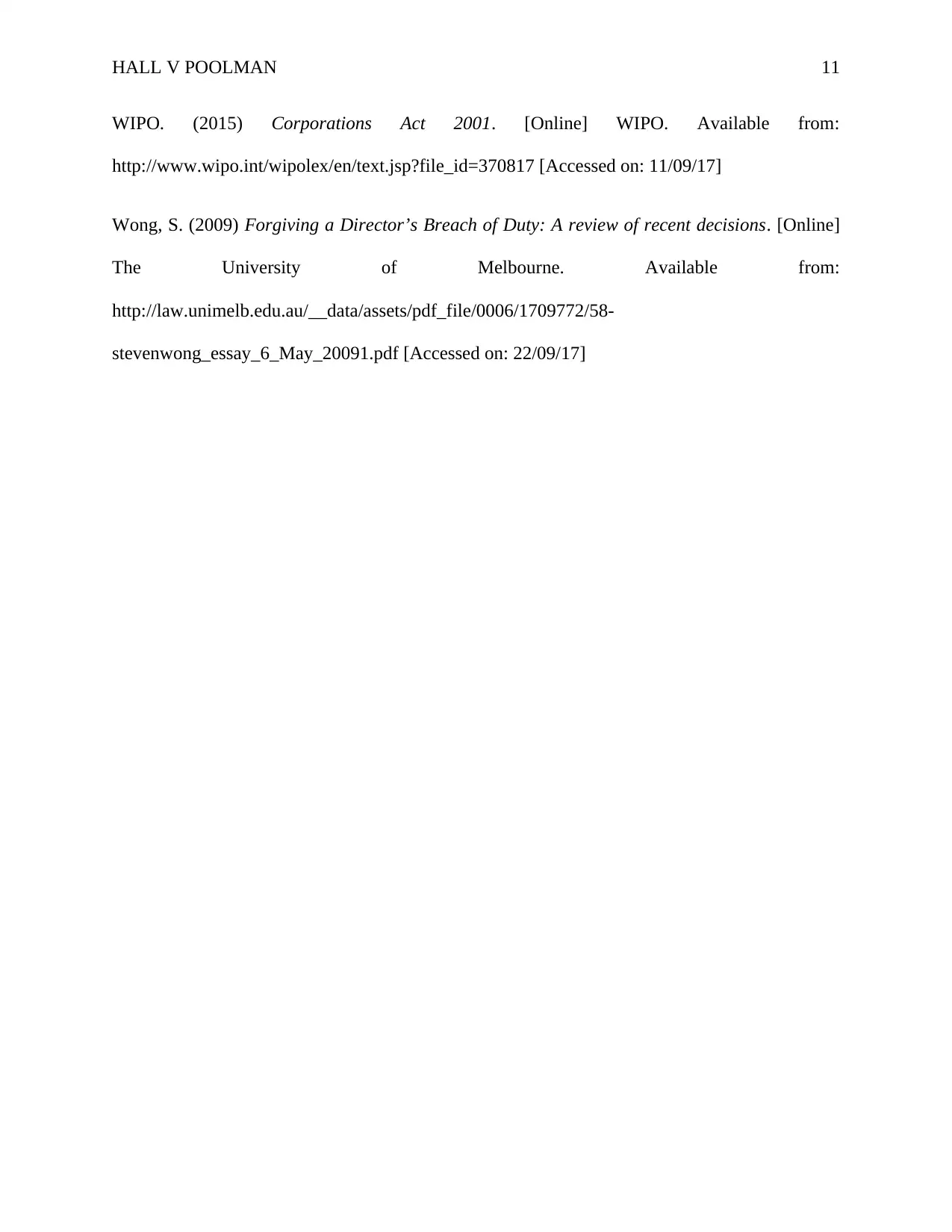
HALL V POOLMAN 11
WIPO. (2015) Corporations Act 2001. [Online] WIPO. Available from:
http://www.wipo.int/wipolex/en/text.jsp?file_id=370817 [Accessed on: 11/09/17]
Wong, S. (2009) Forgiving a Director’s Breach of Duty: A review of recent decisions. [Online]
The University of Melbourne. Available from:
http://law.unimelb.edu.au/__data/assets/pdf_file/0006/1709772/58-
stevenwong_essay_6_May_20091.pdf [Accessed on: 22/09/17]
WIPO. (2015) Corporations Act 2001. [Online] WIPO. Available from:
http://www.wipo.int/wipolex/en/text.jsp?file_id=370817 [Accessed on: 11/09/17]
Wong, S. (2009) Forgiving a Director’s Breach of Duty: A review of recent decisions. [Online]
The University of Melbourne. Available from:
http://law.unimelb.edu.au/__data/assets/pdf_file/0006/1709772/58-
stevenwong_essay_6_May_20091.pdf [Accessed on: 22/09/17]
1 out of 11
Related Documents
Your All-in-One AI-Powered Toolkit for Academic Success.
+13062052269
info@desklib.com
Available 24*7 on WhatsApp / Email
![[object Object]](/_next/static/media/star-bottom.7253800d.svg)
Unlock your academic potential
Copyright © 2020–2026 A2Z Services. All Rights Reserved. Developed and managed by ZUCOL.



![Fodare Pty Ltd v Shearn [2011] NSWSC 479: Director Duties Case Study](/_next/image/?url=https%3A%2F%2Fdesklib.com%2Fmedia%2Fimages%2Fbz%2Fe5781427ac544a2fa81db59f3d03f924.jpg&w=256&q=75)